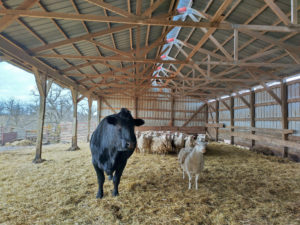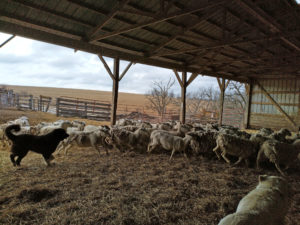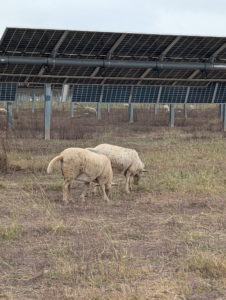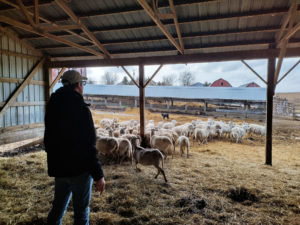Be Like Water
As he plans for the future of his farm, Ryan Herman is flowing with the currents of change to adapt his sheep grazing operation for the present moment.
There is no straight line on the drive to Ryan Herman’s farm. The roads curve through the fractal capillaries of the Driftless Region at the corners of Iowa, Minnesota and Wisconsin. The terrain lines of hills and waterways fold in and out of themselves in a kaleidoscope of redirections as the water meanders around boulders and limestone bluffs on its way to the Mississippi River.
Like the water flowing around their farm near New Albin, Iowa, the last five generations of Hermans have adapted and changed the direction of the farm as well; letting their course flow naturally through what the world demands, and personal desires seek out.
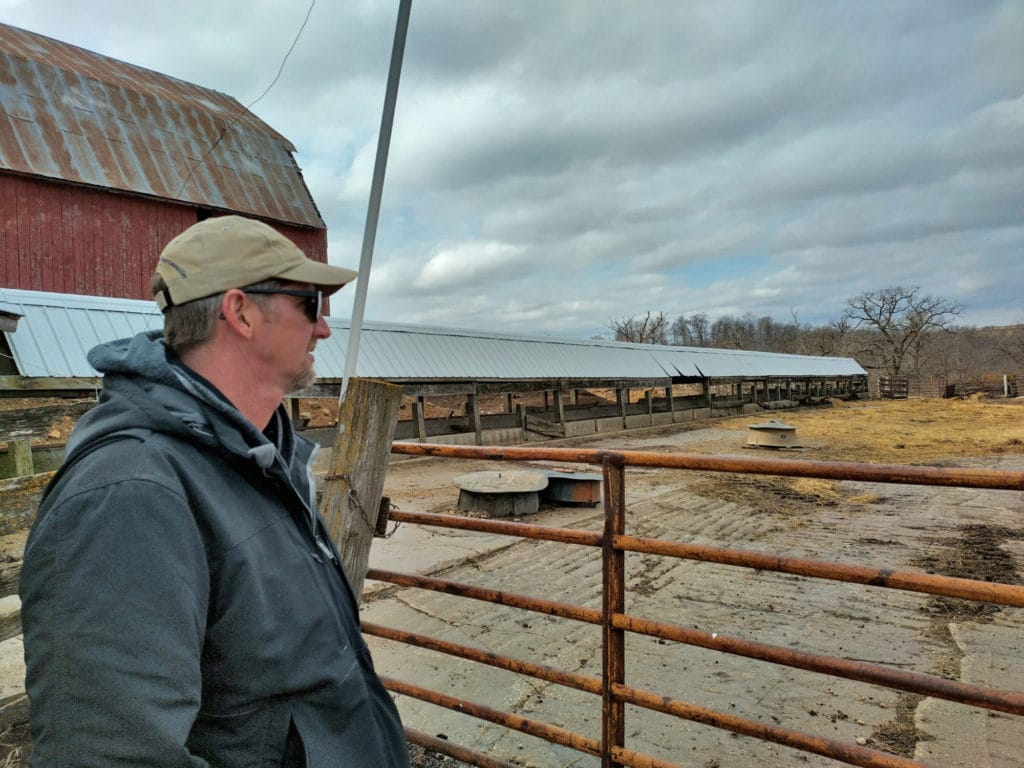
Ryan looks out at the dry lot where the remaining sheep stay for the winter on his farm near New Albin, Iowa.
Ryan’s great-grandfather preferred machines over farming, and milled floorboards from the pasture oaks, marketing them all the way in Chicago. Ryan’s dad disliked dairying, so when all the local labor left for Vietnam during the war, he shifted to a beef herd. Ryan added a new bend to the farm’s story when he first returned. He now finds himself in the midst of another meander reshaping the farm’s flow.
“Ruby, come by,” Ryan directs his border collie. Circumnavigating the glut of sheep milling about the dry lot, Ruby streams across the ground, perfecting her angle. The tension holds for a brief moment. Then, with a flicker of movement, she sends the sheep pouring past each other into the barn, where she corners them.
“Ruby done. Ruby. Ruby done,” Ryan instructs, bringing her back to his side. But the dam holding back her energy can barely hold. She wants to work.
Ruby’s presence, and Ryan’s commands, become part of the rhythm of our conversation. Their to-and-fro frames the visit as we stand in the dry lot, watch the last 50 sheep that remain of Ryan’s once-sizeable flock and discuss the latest evolution to the farm. But Ruby takes dim interest in this chatter: Her eyes are on the sheep. If they start to spread, she’s quick to herd them back into the corner of the barn, where she wants them.
Sheep are a newer development for Ryan, added to the farm in the last decade or so. Until recently, he grazed the sheep together with cattle – which he says was good for soil health. But Ryan found the life cycle and nutritional needs of sheep worked better on his farm. Plus, he appreciates the steadiness in sheep value compared to the volatility of the cattle market. Because of these benefits, he switched to focusing on the sheep and custom-grazing cattle for others during summers only, instead of having cattle year-round. “I still remember the last semi of cattle going and taking a picture of the back of it,” Ryan says. “But for me, custom-grazing in the summer sure works nice.”
“Ruby, lie down.”
Headwaters
She heeds, temporarily at bay. Managing sheep means managing a sheep dog – something Ryan didn’t have to do growing up. When he was young, his dad ran the farm as a row crop and livestock confinement operation.
In college, Ryan started asking questions and wondering about different ways they could manage the land. His dad, seeing Ryan’s interest, gave him Alan Savory’s book “Holistic Management.” Ryan describes delving in, his curiosity whetted, and coming away with more excitement and questions.
On Ryan’s return to the farm, his dad was willing to work with him to shift the farm’s focus. They transitioned all the ground into permanent pasture and changed to grass-finished beef. Ryan is grateful for his dad’s flexibility, and aims to emulate it with his own children.
“At one point, [my dad] sat back and said, ‘Okay, if that’s what you want to do, that’s what we’ll do,’” recalls Ryan. “That’s part of my philosophy with my own kids. There are always opportunities out there. You just have to find what fits best for you and your family.”
“Ruby. Ruby come. Ruby.”
Meanders
Ruby trots back to Ryan after another eager pass around the sheep, re-corralled tightly back into the corner of the barn. These sheep were once part of a much larger flock. But in fall 2024, Ryan sent the vast majority – 1,000 animals – to Texas to graze under a solar panel installation. This remnant flock, plus a docile cow, are all the livestock that now remain on the farm over winter since Ryan’s shift to contract grazing.
These changes comprise the latest twist as Ryan looks downstream to when his kids return to the farm. While they’re still in middle school, Ryan is preparing now – part of which means simply managing to keep going himself. Because of his training in Holistic Management decision-making, which considers social, financial and community aspects, he recognized the need for change. “Health-wise as I get older, it’s physically pretty hard for me to get everything accomplished,” he says.
Under a three-year contract, the day-to-day care of the sheep in Texas is handled by a manager responsible for thousands of sheep, plus a shepherd dedicated to Ryan’s flock. Ryan gets updates every couple of weeks. In March, he and his daughter flew down to help with the spring work: inspection, sorting, worming, etc.
The chance for that close collaboration is partly why Ryan chose to work with this manager. “I can go down there for a few days and learn from him,” Ryan says, “because he has just a ton of experience, and that’s worth quite a bit.” Ryan ultimately wants to graze solar installations closer to home. But it takes time to establish those connections and learn how to do it. This arrangement gives him both time and knowledge.
But in the end, if his kids aren’t into solar grazing, Ryan is open to wherever their passion lies. “My son likes machines
more than I do,” Ryan says. “If he would want to go back to cropping, I feel like I should be open-minded enough to let him do it and help him do it, even though I believe in perennial pasture. I think part of the reason why we’ve been able to keep this farm in the family for five or six generations is that the previous generation has been open-minded enough to, at some point, let the next generation take the reins and run.”
“Ruby. Ruby come now.”
Oxbows
Ryan moves back, hoping that a little distance might lessen Ruby’s sheep fixation. It doesn’t. Standing at the base of the old brick silo, Ryan stares down at her as he muses on the process of change. “In the end,” he says, “change can be hard. It’s painful. We’re creatures of habit.” The same seems true for Ruby also. “But that’s something I’ll say for this farm. Every generation has had to change, adapt, because agriculture is always evolving. I’m afraid if you don’t, eventually you get a little bit trapped.”
Holistic Management has helped Ryan navigate through the process. But he’s also quick to underscore the importance of community. You have to talk with people, he says. “And not necessarily always like-minded people. Try to explain to them what you’re doing and why you’re doing it. That will really make you think sometimes, and you have to have a good answer.”
Rivers flow around obstacles rather than through them. They bend and turn – sometimes doubling back – to keep moving forward. The straight line is not the goal. The river seeks only to continue on its journey.
“I’m just trying to think outside the box and look for opportunities,” Ryan says as Ruby tenses next to him. Focused in on the flock, her brain runs a route before her, calculating and eager to return to her Sisyphean task of putting the sheep in perfect order. There’s always a new approach to the problem.
“Ruby. Ruby done.”

